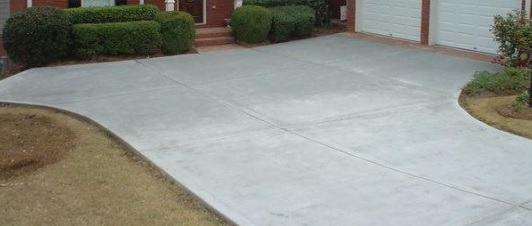There are two types of sealers that can be used to seal a concrete or paver driveway. The first type of sealer is a concrete densifier and the second is a water repellent sealer. Densifiers help to reduce deterioration caused by surface abrasion by increasing the strength and density of the concrete. Water repellent sealers help to reduce damage and deterioration caused by water absorption by forming a hydrophobic barrier within in the pores. Both types of sealers are great driveway sealers, but the best driveway sealer will depend on your reason for sealing, and the currently condition of your driveway.
When to Use a Silicate Densifier
If your driveway is generally kept dry and it showing signs of dusting or deterioration caused by surface abrasion or weak concrete, then you want to use a concrete densifier. Sodium and lithium silicates are the two most common types of concrete densifiers. They chemically react below the surface to form a permanent crystalline barrier within the pores. Once hardened, the barrier helps to increase the strength of the concrete without changing the look.
Concrete densifiers are great sealers to use to increase the strength of the driveway, but they won’t stop damage and deterioration caused by water absorption, snow and ice, and de-icing salts. For this reason, many homeowners and contractors will apply a densifier to the driveway and then a water repellent 5-7 days later.
When to Use a Water Repellent Sealer
Water repellent sealers are the most common type of driveway sealer. Whether you have a concrete, brick, paver, or aggregate driveway, a water repellent sealer will help to reduce damage and deterioration caused by water absorption. When concrete absorbs water from the rain, melting snow and ice, or irrigation systems, a variety of things can happen, including:
- Water can cause the concrete to deteriorate from within the pores.
- When snow and ice melts it is absorbed into the concrete where it re-freezes, causing cracking and spalling.
- Mole and mildew form on the surface from water that sits on the surface and within the pores.
- Water and moisture carry efflorescence up through the pores to the surface of the driveway.
There are many benefits to using a water repellent sealer. They are cost effective, easy to apply, and reduce a variety of the issues listed above.
There are two primary types of water repellent sealers that can be used: siliconate water repellent sealers and Silane-Siloxane water repellent sealers. Here are the differences between the two:
| Siliconate Water Repellent | Silane Siloxane Water Repellent |
| Requires 1 coat | Requires 2 coats |
| Lasts 5-10 years | Lasts 7-10 years |
| Can only be applied to concrete | Can be applied to concrete and masonry |
| Can turn the surface white if over applied | No issues with application |
| Can’t be applied to dark surfaces | Can be applied to light and dark surfaces |
Siliconate water repellent sealers are great to use if you have a white or light poured concrete driveway and want an easy to apply, low cost sealer. If you have a concrete driveway, brick or paver driveway, or aggregate driveway and you want high solids professional grade sealer then you want a Silane-Siloxane sealer.
How To Apply a Driveway Water Repellent
It is very easy to apply a driveway water repellent sealer.
First, make sure the driveway is free of any old sealers. If the driveway is currently sealed, you want to make sure that either the old sealer has been completely removed, or that the new sealer can be applied over it. Water repellent sealers can be applied over silicate densifiers without issue. Water repellent sealers can also be applied over driveways currently sealed with a water repellent sealer so long as the old water repellent is worn down enough where water is quickly and easily being absorbed into the surface. Water repellent sealers can’t be applied over coatings.
Next, you want to clean the driveway and make sure it is clean and free of anything that could prevent proper penetration. The most common way to clean a concrete driveway is with a pressure washer. Oil stains should be spot treated with a product designed for oil removal.
Once the driveway has been cleaned, allow it at least 24 hours to completely dry. Just because the driveway looks dry on the surface doesn’t mean that all of the water has had a chance to evaporate in the pores. Once the concrete driveway has been cleaned, you can now proceed to sealing the driveway.
Water repellent sealers can be applied with a 3/8-1/2″ roller, or a high volume low pressure pressure pump sprayer. You want to follow the application instructions included with the product you will be using.
Links:
Looking for a wet look or gloss sealer? Consider an acrylic sealer instead.

